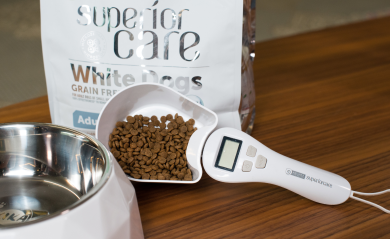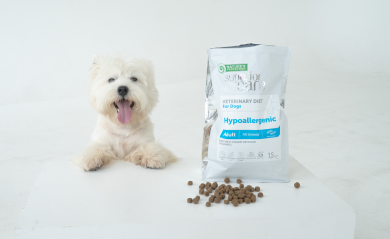What protein sources to choose for pets with tendencies to allergies?
As you may already know, the health of a pet consists of 80% balanced nutrition and 20% every day and veterinary care. This is crucial to know, in order to understand how much impact nutrition can have in causing allergic reactions.
Around 85% of dogs of all breeds are affected by allergies, which can be caused by various allergens, some of which can be found in their food. As a pet nutrition brand, we have observed that one of the ways allergies are indicated is by brown tear stains appearing under the eyes, muzzle and paws. To address this issue, we have collaborated with pet nutritionists and prioritized the use of high-quality, anti-allergenic protein sources and introduced the line – Nature's Protection Superior Care White Dogs – specifically generated to help solve the problem of tear staining.
What are the indications of allergies caused by food intake?

Allergic responses triggered by food can manifest in several forms, with the most prevalent being:
-
Skin inflammation, itchiness, and flakiness
-
Brown discoloration surrounding the eyes, mouth, or paws
-
Foul odor from the ears, ear canal inflammation, and excessive earwax
-
Redness and irritation between the toes, excessive licking, and coat browning
-
Facial swelling or brown staining
-
Alterations in coat pigment or hair breakage, and in some instances, even hair loss.
Which protein sources can trigger allergic responses?

After collaborating with pet nutritionists and veterinarians to create a dry food for white dogs, we determined that various common protein sources in dog food, including popular options, may provoke allergic reactions in white dogs. Our findings indicated that:
-
68% of dogs exhibited symptoms of allergic reactions after consuming dog food that contained beef, wheat, pork, milk, or other dairy products as the primary protein source.
-
25% of dogs displayed allergic reactions after consuming food that contained chicken, eggs, or soybeans as a primary or secondary protein source.
Given these conclusions, our primary objective was to identify protein sources that would not only provide the necessary nutrients for the dogs but also help prevent allergic responses caused by diet. Through research, we identified five protein options that could promote balanced nutrition for my white dogs.
What protein source to choose for allergic dogs?
The following is a list of the top five protein sources that have anti-allergenic properties.
One of these sources is sustainably sourced Norwegian salmon, which is rich in omega-3 fatty acids, including EPA and DHA, as well as vitamins A, B, D, E, and K. These vitamins are essential for maintaining proper bodily function, with omega-3s being particularly important for lubricating joints and reducing inflammation. Vitamin A supports bone and immune health, vitamin B promotes healthy cells, vitamin D regulates calcium absorption, vitamin E is essential for healthy skin and coat, and vitamin K plays a role in blood clotting and energy production. EPA helps manage inflammation-related issues in joints, muscles, skin, coat, heart, and bladder, while DHA plays a role in brain and eye health, improving vision and cognitive function. Since dogs cannot produce these fatty acids naturally, they must be obtained through proper nutrition.
Antarctic krill is a small crustacean that is found in the Southern Ocean and is sourced sustainably. This marine ingredient is rich in protein, Omega-3 fatty acids, and antioxidants, making it an increasingly popular choice in pet food. Omega-3 is crucial for cell function, absorption of vitamins and minerals, hormone production, healthy growth, and disease prevention. Additionally, krill also contains choline, which plays a crucial role in physiological processes that can help prevent heart, liver, and kidney diseases.
White fish, such as Atlantic cod, Whiting, Haddock, Hake, Pollock, and others, are protein sources that can be easily digested and are particularly suitable for dogs that may be susceptible to liver or kidney disease. Foods that are made with this protein source are also a good option for dogs that are prone to allergies. When combined with regular exercise, white fish oil-based food can have a positive impact on LDL cholesterol, glucose levels, cardiovascular health, and strengthen a dog's immunity. Therefore, this protein source is ideal for well-trained or active dogs that participate in activities such as police work, mountain rescues, or shows.
Insects, such as the Black Soldier Fly, are a sustainable and ethical source of energy, protein, fatty acids, and minerals that can be a great option for dogs with nutrition-based allergies. Lamb, on the other hand, is a red meat that is high in iron, making it a good choice for dogs that have iron deficiencies caused by chronic blood loss or a poor diet. It also contains amino acids, calcium, and the right amount of fat to aid in the absorption of fat-soluble vitamins, and is a good alternative for dogs that cannot tolerate beef, chicken, or pork due to allergies or digestive issues.
The coats of white dog's act like a blank canvas, showing any imbalances in their nutrition. Therefore, as an owner, it is crucial to prioritize their health and choose high-quality, balanced food, as well as natural skin and coat care products that meet the needs of their breed. We strongly recommend taking these precautions from the very beginning.


 July 27, 2023
July 27, 2023
 0 comments
0 comments




 March 26, 2025
March 26, 2025






